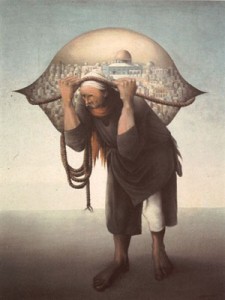What have I learned from hardship?
Sweet are the uses of adversity,
Which like the toad, ugly and venomous,
Wears yet a precious jewel in his head.
— As You Like It, Act II. Scene I
My dad was fond of tossing off quotations from the classics, and this one was probably his favorite. Or maybe I heard it a lot because I spent too much time telling him about my problems. My response to this philosophy was probably a bored shrug.
In those days I knew a little about adversity, knew we all encounter difficult patches (or worse) in life, knew not to indulge in self-pity when events failed to follow my script. But I didn’t see the point of looking for silver linings. Resolution was the thing that interested me.
That’s why, when I became the father of a baby who had major problems, it never once occurred to me to look on the bright side. My kid depended on me! Quite obviously, he needed something that wasn’t being provided. The doctors weren’t losing any sleep trying to understand the situation. The only remaining line of defense was his mother and me. So we devoted the next several years to the challenge of setting things right.
That response still makes sense to me. All of us take steps to deal with our problems. If we have a toothache, we go to the dentist. If we’re lonely, we seek out friends. If we don’t have enough money, we save or try to get more.
So far, so good, but not all problems have such obvious remedies. What do we do when Plan A fails? Do we just try harder? Do we attack from some new direction?
Sometimes the thing never goes away.
Ultimately, that is why I thought What About the Boy? needed to be written. Not just because one kid in six has a developmental problem of one sort or another, but because people untouched by disability have other difficulties that they may argue are even worse. While some lives are easier than others, no one has much reason to feel complacent. I don’t mean for this to bring you down, but if trouble isn’t besetting you right now, it’s coming. It’s on the exit ramp from the freeway. Don’t be surprised when it shows up.
So when someone suggests that my book might be for only a very narrow, niche market, I feel stumped. “Wait!” I want to yell. “I forgot to tell you about the vampires!”
Of course, reading fantasy (or humor, adventure, etc.) can be a nice diversion that empowers us to come back and cope with our issues a little longer. I have no argument with that. It’s just that I wanted to do more than cope. I wanted to win.
My son Joseph achieved significant improvements. His quality of life today is measurably better because of the interventions his mother and I pursued.
But we wanted more. We believed–I still believe–that it was reasonable, right, and just to want more, to claim more, to expect more. We believed a full recovery was his birthright.
When we could not bring that about via human resources, we listened to people who showed us Scripture promising that God answers prayers. We didn’t want to hear other interpretations, those extolling the virtues of patience, fortitude, even brokenness.
This problem broke us. Judy died. My own life then took an unexpected course and–as a direct result of Joseph’s disability–has been transformed in remarkable ways. And yet I still fail to see how this is in Joseph’s interests.
I hope the story in WATB illustrates the importance of taking a stand when doing so seems right. I expect readers will see that, over time, devotion to a good cause may not always inspire the use of good sense. But I feel that something more is yet to be learned here. Maybe I’m still too close to it.
Tags: hardship
